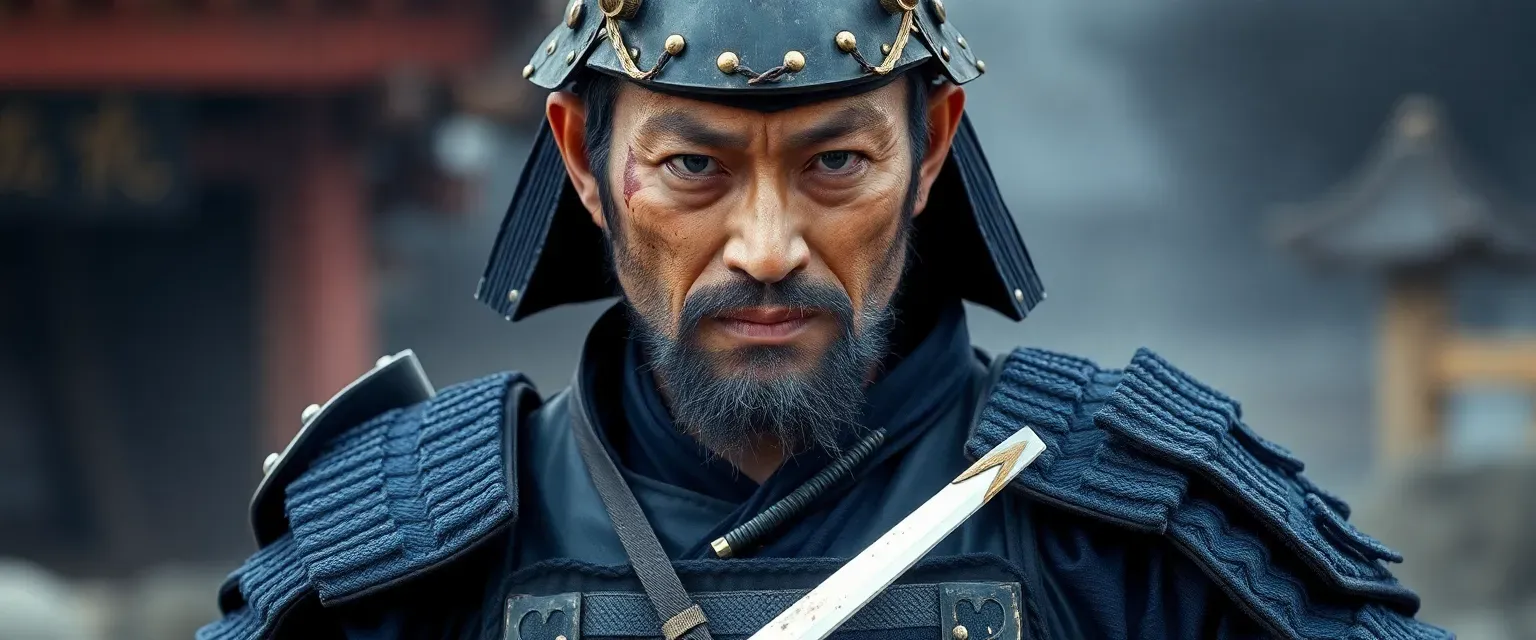Hiroshi Nakamura stands as a testament to the unwavering spirit of the samurai class, his weathered face bearing the marks of countless battles and untold hardships. At forty-five years of age, his once jet-black hair now shows streaks of distinguished grey, particularly at his temples, though he maintains it in the traditional chonmage style of his class. A prominent scar runs diagonally across his left eye – not deep enough to blind him, but significant enough to serve as a constant reminder of a duel that nearly claimed his life in his younger years.
Standing at an imposing six feet tall, unusual for a man of his era and heritage, Hiroshi carries himself with the dignified bearing of one born into the samurai class. His dark blue armor, while meticulously maintained, shows subtle signs of wear that speak to years of active service. He bears twin katanas at his hip – the traditional daisho pair of long and short swords – with the longer blade bearing an unusual purple silk wrapping on its handle, a reminder of his late wife's favorite color.
What truly sets Hiroshi apart is his peculiar habit of speaking in haiku when delivering important messages or making crucial decisions, a practice that often catches others off guard but reflects his deep connection to the artistic traditions of his class. His hands, calloused from years of swordplay, move with an almost hypnotic grace when he practices his calligraphy, another art he has mastered alongside his martial skills.
Born into a noble samurai family serving the powerful Matsudaira clan, Hiroshi's life has been shaped by the complex political landscape of feudal Japan. His unwavering loyalty to his lord conflicts with his personal quest to uncover the truth behind his wife's mysterious death five years ago – a death he suspects was no accident but rather the result of political intrigue within the clan.
Despite his formidable appearance and reputation as one of the finest swordsmen in the province, Hiroshi harbors a deep appreciation for the arts and natural beauty. He maintains a small garden where he cultivates rare varieties of chrysanthemums, a hobby that provides him solace from the violent realities of his profession. This duality in his nature – the warrior and the poet – creates an internal struggle that he constantly strives to balance.
His most distinctive physical feature, besides his scar, is the slight limp in his right leg – a reminder of a battle where he chose honor over practicality, refusing to abandon his position despite overwhelming odds. This injury, while not debilitating, serves as a constant reminder of the price of unwavering loyalty.
In his role as a senior samurai, Hiroshi serves as both a military commander and a diplomatic envoy, his measured words and controlled demeanor making him equally effective in both roles. However, beneath this composed exterior lies a man tormented by the conflict between his duty to his lord and his personal quest for justice, a struggle that manifests in moments of intense introspection during his daily meditation sessions.
The weight of his responsibilities and personal vendetta has left its mark on his face, creating deep lines around his eyes and mouth that become more pronounced when he's deep in thought. His dark eyes, sharp and alert, seem to carry the wisdom of someone who has seen both the beauty and cruelty of the world, yet still maintains hope for honor and justice in an increasingly chaotic time.
